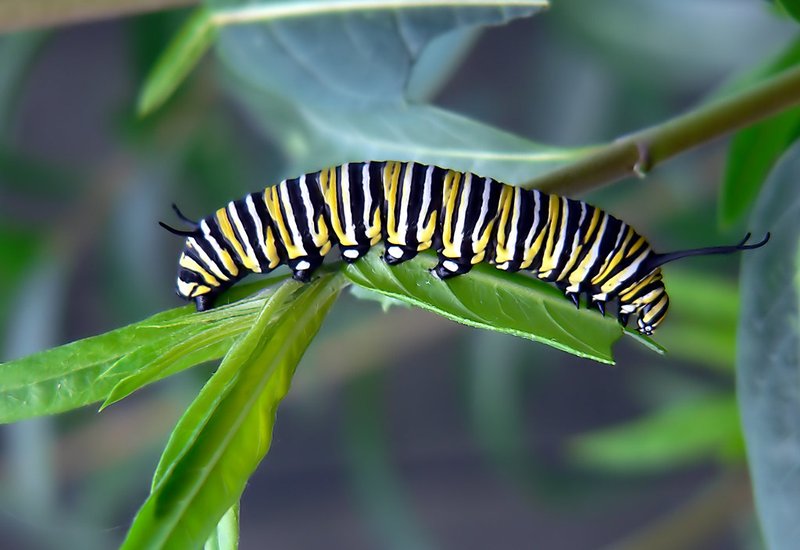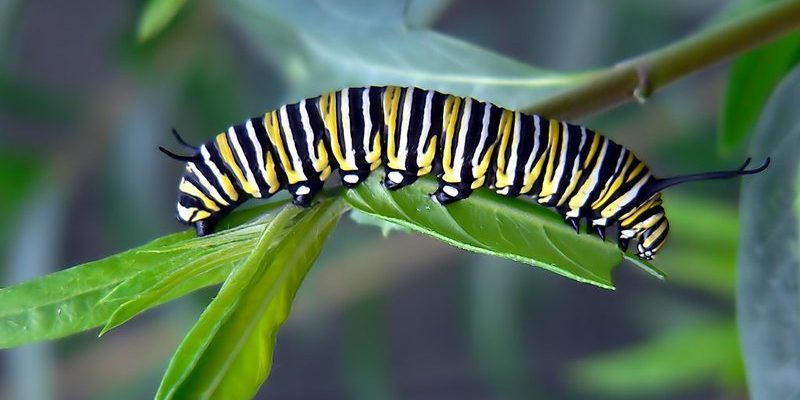
Think of inchworms as the tiny, green or brown caterpillar-like critters that look like they’re inching along in a slow-motion dance. They can be pretty fascinating to watch, but not when they’re chomping on your prized petunias or delicate daisies. In this article, we’ll dive into what inchworms are, how they affect ornamental plants, and what you can do to keep your garden flourishing without worry.
What Are Inchworms?
Inchworms are actually the larvae of various species of moths, mainly belonging to the Geometridae family. They’re often called “loopers” due to the way they move, arching their bodies as they crawl. Imagine a tiny caterpillar that doesn’t quite know how to walk—this is pretty much what an inchworm looks like! While some might think they have a charming appearance, they can cause quite a bit of trouble in a garden setting.
These little creatures usually have a green or brown coloration, which helps them blend into their surroundings. This camouflage can make spotting them tricky. If you’re walking through your garden and see leaves that look like they’ve been chewed on but can’t spot any pests, inchworms could be the culprits at work.
How Do Inchworms Damage Ornamental Plants?
You’re probably asking yourself just how much harm these inchworm critters can do to your beautiful flowers and plants. Well, inchworms primarily feast on leaves, making their way through the foliage in a rather indiscriminate fashion. They can munch on the leaves of various ornamental plants, including:
- Petunias
- Daisies
- Daylilies
- Hostas
- Rhododendrons
This feeding can lead to significant leaf loss, which may not kill your plants immediately but can weaken them over time. A healthy plant needs its leaves to photosynthesize and grow, so losing those leaves can leave your ornamental garden looking bare and sad. Here’s the thing: if the infestation is severe, it could even stunt the growth of your plants, leaving them vulnerable to diseases.
Signs of an Inchworm Infestation
So, how do you know if inchworms have invaded your garden? There are a few telltale signs you can look out for. First, keep an eye on your plant leaves. If you notice *irregular holes* or *chewed edges*, it might be a sign that inchworms are snacking on your plants.
Another sign of an infestation is webbing or frass (which is just a fancy word for insect droppings) on or near the affected plants. If you’re still not sure, try looking for the inchworms themselves. They’re usually found on the underside of the leaves, trying their best to stay hidden from predators—like you! Checking your plants regularly can help catch any infestations early before they get out of hand.
Preventing Inchworms in Your Garden
Prevention is usually the best strategy when it comes to inchworms. If you can stop them from establishing a foothold in your garden, you’ll have a much easier time keeping your plants healthy. Here are some effective ways to prevent inchworm infestations:
– **Regularly Inspect Your Plants:** Make it a habit to check your plants for any signs of damage or pests. The sooner you catch an issue, the easier it will be to manage.
– **Encourage Natural Predators:** Birds, wasps, and certain insects can help keep inchworm populations in check. Attracting these natural enemies to your garden can help maintain a more balanced ecosystem.
– **Maintain Healthy Plants:** Stressed plants are more susceptible to pests. Ensure your plants are well-watered, properly pruned, and fertilized as needed to keep them healthy.
By being proactive, you can create an environment that’s less inviting to those pesky inchworms.
Controlling Inchworm Populations
If you’ve already discovered inchworms munching away in your garden, don’t panic! There are plenty of ways to control their population without resorting to harsh chemicals. Here are some options to consider:
– **Handpicking:** For small infestations, simply plucking inchworms off your plants and relocating them can be effective. It’s a little time-consuming, but it’s a natural solution.
– **Natural Insecticides:** Products that contain Bt (Bacillus thuringiensis) are effective against inchworms. This natural bacterium specifically targets caterpillars without harming beneficial insects.
– **Neem Oil:** This natural plant extract can help deter various pests, including inchworms. Just mix it with water as directed on the label and spray it on affected plants.
– **Chemical Controls:** If all else fails, there are chemical pesticides available. However, these should be used as a last resort to avoid harming beneficial insects or pollinators.
Let’s be honest; nobody likes dealing with pests in their garden, but with some diligence and the right strategies, you can minimize the impact of inchworms on your ornamental plants.
Common Misconceptions About Inchworms
There are plenty of myths out there about inchworms, and it’s essential to set the record straight. One common misconception is that inchworms only attack weak or unhealthy plants. In reality, they can be found on healthy plants too, especially if food is plentiful.
Another misconception is that all inchworms are the same and pose the same level of threat. The truth is that there are many species of inchworms, and some may be more damaging than others. Knowing which type of inchworm you’re dealing with can help you choose the best control method.
Finally, some folks think insecticides are the only effective way to handle inchworms. But, as we discussed, there are various natural methods to keep these pests at bay. It’s all about finding the right balance for your garden.
To wrap it up, inchworms can indeed affect ornamental garden plants, but with a little knowledge and proactive care, you can keep them in check. By regularly inspecting your plants, promoting natural predators, and employing effective control methods, you can enjoy a flourishing garden free from damage.
After all, your garden is more than just a collection of plants—it’s a labor of love. By being aware of potential threats like inchworms, you can ensure that your plants stay healthy and vibrant. So the next time you’re strolling through your garden, take a moment to appreciate your hard work—and keep an eye out for those inchworms!

